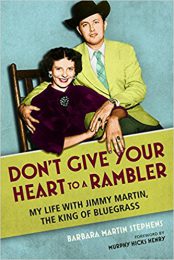There are several unusual aspects of this very honest and at times hard to read biography nut not because the author Barbara Martin Stephens, once the wife of famous bluegrass musician Jimmy Martin (1927-2005), chose to write in incomprehensible sentences or wrote her story very badly.
 The reason this title has some very difficult parts has to do with the contents and the amount of brutality, violence and carelessness that the author had to endure for some of the fourteen years of marriage to protect her family and the four children she had with him.
The reason this title has some very difficult parts has to do with the contents and the amount of brutality, violence and carelessness that the author had to endure for some of the fourteen years of marriage to protect her family and the four children she had with him.
Barbara Martin Stephens here gives a very vivid and straightforward impression of life in the 1940s and 1950s; if you were an active part in the world of country and bluegrass music. Her biography sometimes has the terrible air of a crime story when she recounts the numerous emotional outbursts, the physical violence and emotional abuse of her husband Jimmy Martin over many years.
Martin, a master singer and genius songwriter who recorded dozens of all-time bluegrass classics and one altogether brilliant musician – hence his moniker The King of Bluegrass – with the highest possible reputation in bluegrass as member of both (Bill Monroe’s) Blue Grass Boys and the Osborn Brothers, the guitarist also performed with Hank Williams before forming his own band The Sunny Mountain Boys in 1955.
But Martin also had a very disturbing personal side, one unbeknownst to his audiences and fans, one that was reserved for those close to him and most of all his wife and family. At times, when sober, he would be a good father and husband as it seemed. But when drunk and if he had the feeling of losing control, those people close to him would become his enemies, as Stephens writes. Heavy drinking, continuous infidelity, dangerous mood swings, jealous rages and physical attacks directed towards his wife were the result that destroyed not only his family life but his musical career, since the author then was not just his wife but also his booking agent. Female bookers were non-existent in the 1950s but since Martin’s original booker failed to obtain gigs someone had to do the job; otherwise the family literally would have been left to starvation.
Maybe the most devastating “punishment” Jimmy Martin received was his exclusion from the Grand Ole Opry. He never did get on the show as a regular, for he, the married man, spent an entire weekend with Bill Monroe‘s daughter, ignoring the father’s strict warning. As The Opry, with its live broadcasts, also required a certain moral codex of its regular musicians as to appear on time, perform strictly sober, do their part and then leave the stage without making sarcastic remarks about other musicians or starting a fight on stage. Just the things Martin was not able to do, in fact, behavior he became infamous for in the business.
So apart from giving a rare insider’s view of Nashville’s music scene and of how life with a famous bluegrass musicians used to be, this account also gives a good impression of what social roles women were expected to fulfill, no matter how their husbands acted and what socioeconomic problems professional musicians (and their families) were facing back then. In this respect the book is unusual and a very rare publication where a former partner/booker takes the opportunity to write a musician’s biography and simultaneously tell her autobiography.
For the music historian and bluegrass lover, his title is of interest, be it for the wealth of information on the music industry, the forerunners of bluegrass festivals, booking routines of the past and many anecdotes on famous fiddlers, guitar players and banjo pickers.
At the same time, though, it may urge not a few readers to correct their impression of Jimmy Martin, the person behind the music.
Review by Dr. A. Ebert © 2017
Barbara Martin Stephens. Don’t Give Your Heart to a Rambler: My Life with Jimmy Martin, the King of Bluegrass (Music in American Life). University of Illinois Press, 2017, 240 p.
